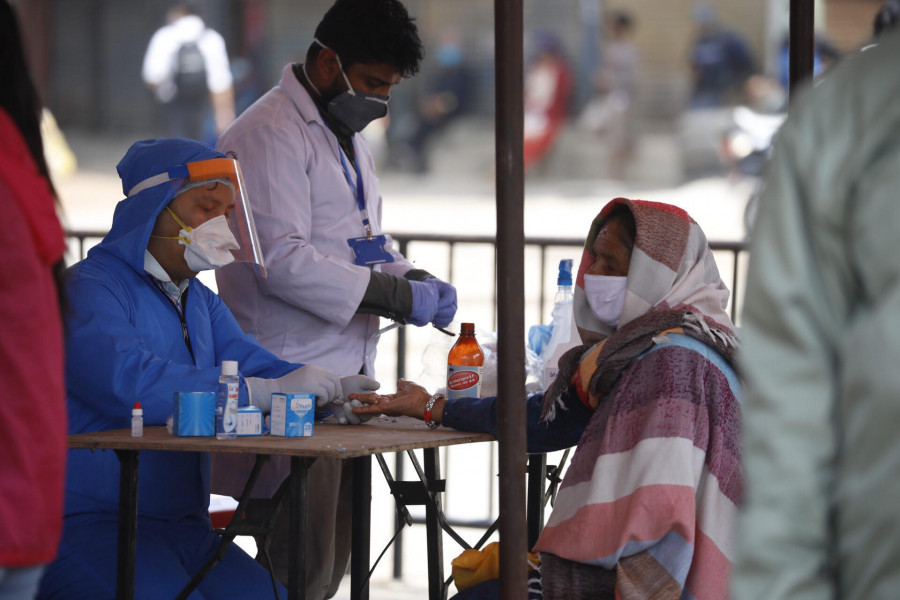Health
Antigen test mandatory for those entering Kathmandu Valley with any Covid-19 symptom
The measure comes as Nepal recorded more than 200 cases in 24 hours for the first time since January. Kathmandu Valley alone accounted for 137 of the cases.
Post Report
The government has made antigen testing mandatory for those entering Kathmandu Valley with symptoms akin to coronavirus infection.
According to Chief District Officer of Kathmandu Kali Prasad Rijal the meeting of Kathmandu District Covid-19 Crisis Management Centre held on Monday decided to establish health desks for antigen tests at all the municipalities where the entry points to the Valley are situated.
After Kathmandu, Lalitpur and Bhaktapur—two other districts in the Valley— are also following suit, according to officials.
“We have decided to make antigen testing mandatory for all those coming to Kathmandu Valley with any symptom of Covid-19,” said Rijal. “We will begin the tests within a day or two.”
Swabs of the visitors suspected of having the virus on the basis of symptoms of Covid-19 will be taken for the polymerase chain reaction tests even if their antigen test reports are negative.
“As part of their effort to control pandemic they have decided to tighten the flow of suspicious visitors to Kathmandu Valley by initiating antigen tests at the entry points,” Khagaraj Baral, secretary at the Covid-19 Crisis Management Centre, told the Post.
Due to the increasing number of cases of infections, Baral said district Covid-19 crisis management centres have been authorised to take necessary decisions to control the pandemic.
Officials at the Ministry of Health and Population said that the ministry has decided to perform tests only on symptomatic people.
“We have been performing antigen tests even on people returning from India who have Covid-like symptoms,” Dr Samir Kumar Adhikari, joint spokesperson at the Health Ministry, told the Post. “It is impossible to perform tests on all people.”
Adhikari concedes that risk of spread of infection remains as even people who do not exhibit symptoms can be infected with coronavirus and there are chances of spread of the virus from such people.
“The important thing is we should follow the safety measures including using face masks, hand washing using sanitisers and others,” added Adhikari.
Monday’s meeting of the Kathmandu District Covid-19 Crisis Management Centreof has also decided to bar unnecessary public functions.
In the case of events that cannot be postponed, the authorities have advised the hosts to put in place adequate safety protocols and ensure that they are strictly implemented.
The centre has also directed all the municipalities of the district to maintain existing quarantine and isolation centers and ensure that there is a quarantine and isolation centre in each municipality.
According to the Health Ministry, 266 new cases and four deaths were reported in the country in the last 24 hours.
This is the first time that the number of cases in 24 hours has crossed the 200 mark for the country and the 100 mark for the Valley since January.
The number of active cases stood at 1,832 as of Monday evening. The number of cases in Kathmandu Valley during this period stood at 137.
Nepal has so far reported 278,210 cases of coronavirus infections and a death toll of 3,036. Four persons died within the last 24 hours due to Covid-19 complications, according to the Health Ministry.
Meanwhile, Minister for Health and Population Hridayesh Tripathi on Monday warned that infection of the coronavirus could reach its peak in May and June.
The country had recorded 5, 743 cases on October 21, the highest in a single day.
The number of new cases declined after the government stopped performing free testing on asymptomatic patients. Authorities have also stopped contact tracing.
Addressing a meeting of the House of Representatives on Monday, Minister Tripathi said that new cases of infection have started to rise in recent weeks.
“If we cannot make public health measures effective, new cases will rise in the coming days and reach a peak in May and June,” said Tripathi. “The government is ready to enforce public health measures to lessen the infection rate.”
Adhikari, joint spokesperson for the Health Ministry, said that India has yet to reach its peak and past experience shows that it takes about one two months to reach the peak in Nepal.
On Sunday India reported 103,558 cases, the highest in one day since the pandemic began from less than 10,000 in February.




 22.12°C Kathmandu
22.12°C Kathmandu














